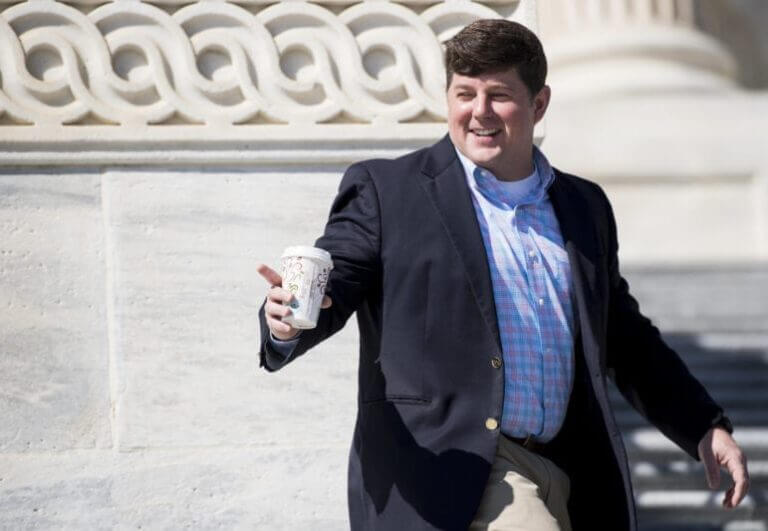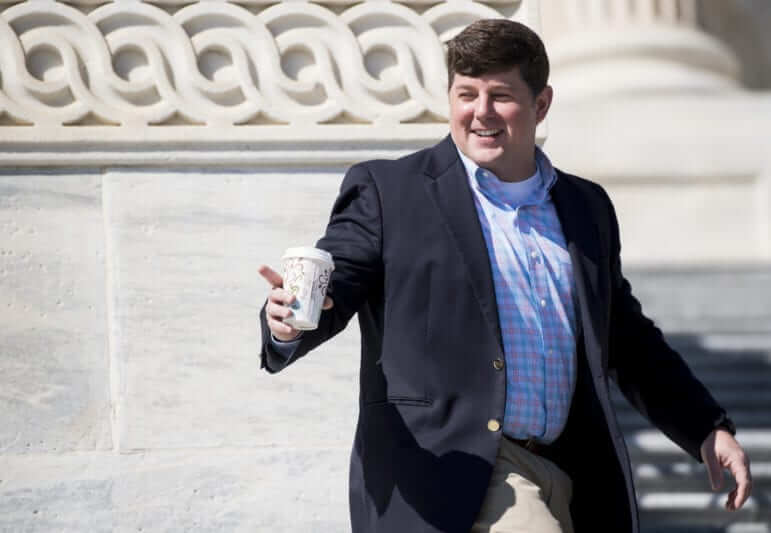

As a congressional ethics office investigates U.S. Rep. Steven Palazzo’s campaign spending, a deeper look at his campaign finances raises questions of whether he uses his account as a second personal income.
Palazzo spends thousands of dollars a year from his campaign account on meals, from the swankiest restaurants and clubs in Washington, D.C., and Mississippi, to Hooters, Newk’s, pizza and fast food chains, and live music and barbecue joints.
In all, Palazzo has spent more than $115,600 on meals since he took office in 2010 — an average of $11,560 a year — not counting the nearly $188,000 he spent catering events and booking venues for his campaign. By comparison, his colleague Rep. Michael Guest since he took office has spent less than $1,300 a year listed as meals separate from larger catered campaign events.
Palazzo has also spent tens of thousands of dollars on hotel rooms in D.C., Mississippi and beachside Florida resorts, entertainment and golfing — including a $3,100 golf cart. The campaign also has spent nearly $42,000 on “gifts.”
The Office of Congressional Ethics is investigating Palazzo’s campaign spending after the Campaign Legal Center watchdog group in March filed a complaint. That complaint centered on whether Palazzo used campaign funds to pay himself and his erstwhile wife nearly $200,000 through companies they own.
Palazzo, through a campaign spokesman, said the complaint and questions about his campaign spending are “politically motivated,” and that Palazzo is cooperating with the OCE investigation and will be exonerated.
“This all started with Congressman Palazzo’s primary opponents in the 2020 Republican primary, and it is all just politically motivated,” said Palazzo campaign spokesman Justin Brasell. “… All of this is permissible, except where we found a couple of mistakes and we fixed it.”
The mistakes, Brasell said, were the campaign’s purchase of a $5,100 fold-up wall bed, or “Murphy bed,” and nearly $2,000 in continuing accounting education for Palazzo, who is a CPA.
“The (bed) purchase was for office furniture in the D.C. office,” Palazzo’s campaign said in a written statement. “We thought it was allowable only to learn later it was not … After inquiring on (continuing education), we were told this was not allowed.”
Brasell said Palazzo has reimbursed the campaign for those expenditures. The campaign also corrected what it said was a “typo” in Palazzo’s campaign reporting — a $119,771 payment originally listed to the Hyatt Regency hotel on Capitol Hill was only for $1,197, spent on “hotel rooms for Congressman Palazzo’s family for campaign events they attended in D.C.”
The Campaign Legal Center said Palazzo, who makes $174,000 a year as a congressman, appears to be using his campaign account as a “personal slush fund.”
Federal law and U.S. House rules prohibit conversion of campaign money to personal use. Violations of the Federal Election Campaign Act can carry felony criminal penalties. The OCE investigates such complaints and can recommend they be dismissed, handed off to the House Ethics Committee for further review or discipline, or refer them to the U.S. Department of Justice for criminal investigation.
Brasell said Palazzo has not been contacted by any agencies or investigators other than the OCE.
Robert L. Deming III, a Biloxi city councilman who unsuccessfully challenged Palazzo in this year’s Republican primary, said he saw what he believed were “red flags” with Palazzo’s campaign account and “unfathomable” spending. He said he hired an investigator and election compliance experts and turned over his findings to the CLC, U.S. attorney’s office and “everybody I could think of.”
Deming said it “absolutely” appeared Palazzo was using his campaign account for personal spending. He said he did not try to make this a big issue in his run against Palazzo — although other opponents did — but that he felt bound to report it.
“I just did my duty as a citizen,” Deming said. “When you see something that doesn’t look right, turn it over to the proper authorities and let them do their job.”
The CLC complaint being investigated by the ethics office is centered on:
- More than $60,ooo in monthly rental payments of $3,000 from the campaign to a property company called Greene Acres MS that Palazzo owns in Perkinston. Palazzo claims this was for a campaign office, but the complaint said there is a “lack of any publicly available information” about the campaign having used such an office.
- More than $146,000 to his now former wife’s accounting firm — which Palazzo turned over to her after he took office. The campaign also was paying another accounting firm “for apparently the same services,” the complaint said. Palazzo’s campaign, the CLC complaint says, in recent years has paid nearly as much for accounting services as his three Mississippi House colleagues paid combined. Brasell said the Palazzo firm handled the campaign’s day-to-day accounting while the other firm handled FEC compliance and reporting.
But the payments also raise questions about Palazzo’s separation and later divorce from his wife. The 2016 divorce settlement said Palazzo shall “continue to pay the wife rent” of $1,500 a month on an Arlington, Va., condominium in which he has lived while in D.C. Palazzo’s campaign payments to the accounting firm are mostly for round numbers, Deming said, and on aggregate total nearly the same amount as $1,500 a month rent would.
Palazzo’s divorce records also said he would be responsible for debt on a Perkinston home and property, raising questions of whether his payments to his Greene Acres property company were campaign related or for mortgage on the home and property.
Brasell said all of Palazzo’s campaign spending has been for campaign-related expenses.
For instance, of Palazzo’s campaign spending on meals, Brasell said, “It is commonplace to hold meetings at restaurants and pay for meals for campaign staffers, volunteers and donors.”
“Members are allowed to expense meals that are incidental to their role as a candidate as an officeholder, such as food for campaign events, fundraisers or strategy sessions.”
The campaign did not specify what campaign events or strategy sessions were held at a Hooters in Mississippi. Campaign records indicate expenditures of $57.41, $63.65, $89.78 and $394.63 for meals at Hooters, among more than 550 meals listed in the campaign account.
Most of the campaign meals listed run from a few dollars at fast food places to hundreds of dollars at steak houses or fancy restaurants. One is for more than $3,655 at the Capitol Hill Club. Others include $461 at Ruth’s Chris Steakhouse and $533 at Beau Rivage Prime casino restaurant.
Federal officeholders and campaign staff are allowed to expense meals “incidental” to their role as officeholder or candidate, such as campaign meetings and events, strategy sessions or fundraisers.
Other lawmakers have come under scrutiny for their meal and other spending, such as Rep. Mike Turner of Ohio, who spent more than $70,000 from his campaign account since 2017 on meals, and Rep. Duncan Hunter of California, who pleaded guilty of misuse of campaign funds and resigned after being accused of spending more than $200,000 from his campaign account on family vacations abroad and large bar tabs.
Other notable expenditures from Palazzo’s campaign funds include:
- Nearly $42,000 in “gifts.” These gifts include thousands of dollars worth of liquor and wine and purchases from a tactical clothing outfitter, a cowboy boot store and university campus stores. The campaign said these are “memorabilia for fundraising events, items given to silent auction events for local political party groups, etc.”
- More than $12,700 on sporting events in the Washington, D.C. area. This includes about $2,000 on “fundraising expenses” at Washington Nationals baseball games, and more than $10,600 with Washington Suite Life, which offers suites at sporting and other events. Palazzo’s campaign said these expenses were for “tickets to the Nationals game for the fundraising event.”
- More than $53,000 on golf-related expenses. This includes more than $3,100 for a golf cart for campaign events and thousands of dollars for golf balls, hats and tees with his logo on them. The campaign has for years held a golf tournament fundraiser at the Preserve Golf Club on the Coast.
- Nearly $7,500 for “trailers.” The campaign has made five expenditures over several years for trailers, including one in 2018 for nearly $2,200 to MCPAL Company for an “enclosed trailer.” Secretary of State filings show Palazzo’s mother is president of MCPAL Company. Palazzo’s campaign said the MCPAL payment “was a reimbursement for a borrowed trailer that was stolen during the campaign.” The statement said, “As of now the campaign has one covered trailer and one flatbed trailer.”
Brasell said Palazzo’s campaign spending is all aboveboard and all on “political expenses, fundraising, campaign expenses.”
“He has to constantly run for office, every two years,” Brasell said. “This is all just routine (campaign spending), they’re just trying to spin it and make it seem otherwise.”
Kedric Payne, general counsel and director of ethics for the Campaign Legal Center, said: “The big picture is that this diminishes the public’s trust when a congressman uses campaign money for a personal slush fund. It is encouraging to see there is an investigation into this.”
The post Rep. Steven Palazzo ethics investigation: Is the congressman’s campaign account a slush fund? appeared first on Mississippi Today.
- Fannie Lou Hamer’s Medal of Freedom finds home in Mississippi Civil Rights Museum - February 10, 2026
- Court to review alternatives to Jackson water rate increase. Utility brushes them aside - February 10, 2026
- Mississippi House passes Sunday alcohol sales and direct shipment of liquor - February 10, 2026